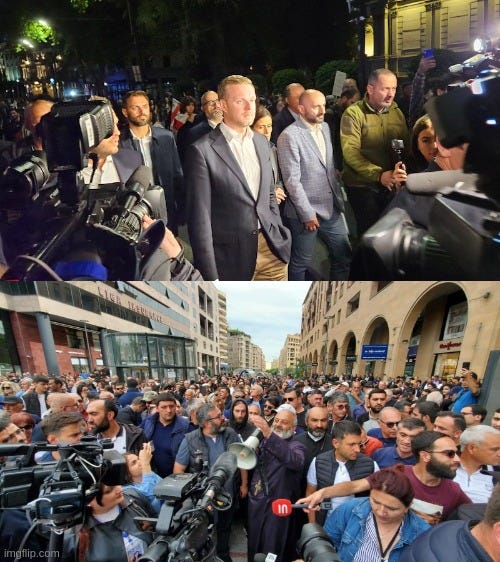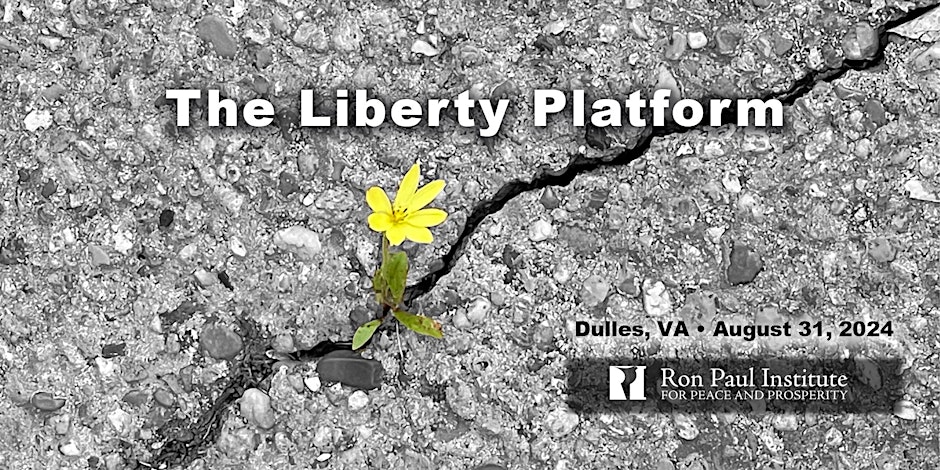“It is in minds of middling vigour and middling capacity that are born erroneous opinions, for they follow the apparent truth of their first impressions and do have a case for interpreting as simplicity and animal-stupidity the sight of people like us who stick to the old ways, fixing on us who are not instructed in such matters by study.”
– Michel de Montaigne [I.54]
“The beginnings of religions, republics, and kingdoms must always contain in themselves some goodness through which they may regain their early prestige and their early expansion. And because in the course of time that goodness is corrupted, if something does not come about to bring it back to its proper limits, it will, of necessity, kill that body.”
– Machiavelli [Discourses, III.1]
Which Way, Caucasian Man?
Western media has been filled with fawning coverage of pro-foreign influence protesters in Tbilisi, Georgia. It may not have been an overall top news story, but if you are the sort of person who reads the “International News” section, you could not have missed it. At issue is what has been billed the “Russian law” approved in Parliament by the ruling Georgian Dream Party which would make non-governmental organizations [NGOs] receiving more than 20% of their funding from abroad provide some basic financial information, which they usually publish on their website and admit to unprompted in interviews. The “non-governmental organizations” such as Transparency International [which gets the majority of its funding from governments] are losing their minds at the premise that they should be subject to transparency requirements. This all looks like a very unsubtle “Color Revolution.” However, it is hard to say if the protesters are centrally directed foreign agents- well, besides the President of Georgia who is literally a career French diplomat– or if the foreign funded “civil society” groups just know what is wanted of them because this is what they are for. The foreign powers are certainly being brazen, with the EU attempting to suspend Georgia’s membership process if the law is passed and multiple foreign ministers showing up to march with the protesters and speak in favor of allowing unfettered foreign interference. Georgia is at a pivotal moment, where it may be decided if its future will be determined by the general public or by the same narrow class of Western “educated” midwits who have ruined Ukraine; these people are tenacious as they have no marketable skills which would get them paid on a Friday besides as agents of governments and oligarchs.
To the south of Georgia, in Yerevan, Armenia, there have been different protests, almost completely ignored in Western media. You can find stories if you know what you are looking for, but it is tepid and circumspect coverage, worlds apart from the media’s praise on Georgia’s Western stooges. However, Armenia’s story is even more important- and compelling. This once great Kingdom has been continuously betrayed by its Prime Minister Pashinyan, who has alienated every important ally and repeatedly sold out the country to their implacable enemies in Azerbaijan. For a time, whether he was malicious or just incompetent was an open question, but now much of the public has settled solidly on the former. The Armenians are already reduced, victims of the Turkish genocide which devastated their population, and, all but alone, it seems as if there is little left for Pashinyan to do but leave the corpse of the nation of the neighboring Turkic peoples to pick over. While there is a lot of sense in getting what peace they can while they build up their military to fight another day, Pashinyan and his supporters among the same Western educated stooge class we see in Georgia are determined to move towards a Europe and NATO that can’t and won’t protect them.
Relations with Russia and the CSTO alliance of which Armenia is an erstwhile member seem beyond repair. The Armenians, however, are an ancient, proud, and brave people, ready to fight for what remains of their homeland. A genuine popular movement called “Tavush for the Homeland,” named after border region threatened by Azerbaijan, has arisen behind an Archbishop named Bagrat Galstanyan. In this time of crisis many Armenians, the first nation to officially adopt Christianity, seek protection and unity in the power of their faith, and wish to avoid any more capitulations such as that which recently saw over 100,000 of them ethnically cleansed from their ancestral homes in Artsakh [Nagorno-Karabakh on most international maps.]
While the situation in Georgia is important- mostly because the deranged response to having to post a few financial documents shows just how powerful foreign actors are- the Armenians are fighting for their lives. The Georgian Dream Party must tread carefully and try to resolve this situation while avoiding a Maidan, whereas Armenians must mobilize their whole society against Pashinyan and his cronies, place new leadership, dig in, and orient their whole society around defense. Armenia is in a fight to survive right now, whereas Georgia is fighting against the dreadful rule of Westernized “patriotic” internationalists who would probably seek to antagonize Russia into destroying the country in the future should they take power [it needs to be noted that while the Azeris have deep seated hatred for Armenians, Russians have no such sentiment towards the Georgian people in general, despite what Ukraine supporters may tell you.] In both instances, the Western powers are trying to lead these countries towards the situation which is most likely to see them victimized and destroyed. Hence, the enthusiasm about protests in Tbilisi and the silence about Yerevan.
Georgia: The Swarms of Foreign Minions
I wrote about the Georgian protests regarding this same matter last year. At the time, my view was that the best move for the government was to delay dealing with the problem and hope the situation would change and they might find themselves in a better spot to proceed. They did drop the bill for a time and let the country calm down, but their enemies remained determined. With the War in Ukraine dragging on and Georgian elections approaching, it was time to again try to deal with the problem of widespread foreign influence in Georgia.
Read the rest and support the author here.


